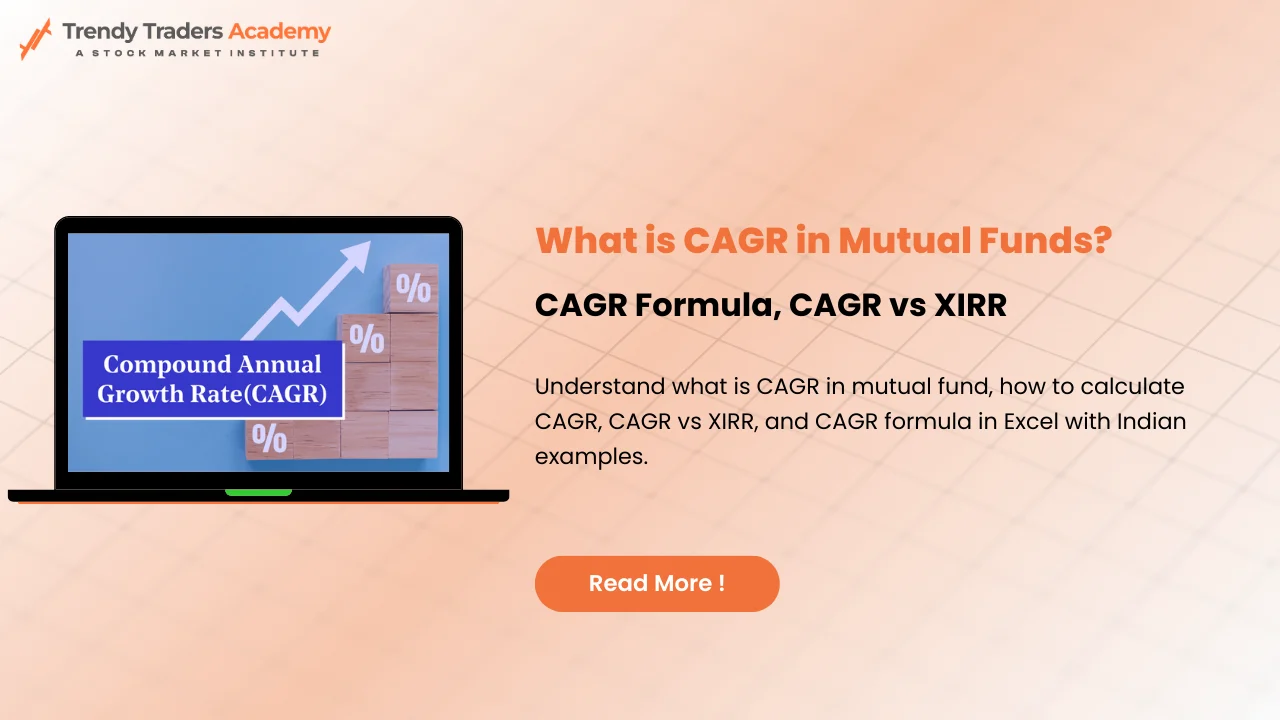
Capital Gains Tax in India | Avoid Tax & Use Calculator
Ever wondered why your investment profits don’t always match the money you take home? That’s where Capital Gains Tax in India comes into play. Your gain or profit regardless of whether you are selling property, mutual funds or stocks, is taxable. Knowledge about this tax can save you thousands and make you make more intelligent investment choices.
We will go step by step explaining the definition, mechanics and process of capital gains tax, how to save or avoid it and how to calculate your tax using online tools such as the capital gains calculator. Imagine that this article is your roadmap that you can use to feel comfortable moving around in the investment taxes world.
What is Capital gains tax in India?
The Capital Gains Tax (CGT) is a tax levied on the profit made on the sale of a capital asset – property, shares, mutual funds, or gold. Tax is only paid in cases where the purchase price was lower than the actual sale price.
Simply put: Capital Gain = Sale Value – Purchase Cost- Transfer Expenses.
Thus, when you purchased land at 50 lakh rupees and sold it at 80 lakh rupee, your 30 lakh gains would be subject to capital gains tax.
Types of Capital Gains
The capital gains will be classified depending on the duration of your holdings:
- Short-Term Capital Gain (STCG): Asset that was sold within a short time.
- Long- Term Capital Gain (LTCG): Asset that is held longer before being sold.
Short-Term vs Long-Term Capital Gains
Type of Asset | Short-Term Holding Period | Long-Term Holding Period |
Equity Shares / Mutual Funds | < 12 months | > 12 months |
Property (Land/Building) | < 24 months | > 24 months |
Debt Mutual Funds | < 36 months | > 36 months |
Gold / Jewelry | < 36 months | > 36 months |
Knowing this distinction helps determine which tax rate applies to your transaction.
Capital Gains Tax Rates in India
Type of Gain | Applicable Tax Rate |
Short-Term Capital Gains (Equity) | 15% (u/s 111A) |
Long-Term Capital Gains (Equity) | 10% (above ₹1 lakh, without indexation) |
Short-Term on Property / Other Assets | As per income tax slab |
Long-Term on Property / Other Assets | 20% with indexation benefit |
Indexation adjusts your purchase cost for inflation, reducing your taxable gain.
Capital Gain Tax on Property in India
While you sell land, flat, or a house, the capital gain tax on property in India depends on how long you’ve held it:
- Held < 24 months: Short-term, taxed as per your income slab.
- Held > 24 months: Long-term, taxed at 20% after indexation.
You can reduce tax by reinvesting in another property or bonds (under Sections 54, 54F, and 54EC).
Capital Gains on Shares and Mutual Funds
Equity Shares / Equity Mutual Funds:
- LTCG over ₹1 lakh – taxed at 10% (without indexation)
- STCG – taxed at 15%
Debt Mutual Funds:
- Taxed as per your income slab after Budget 2023 changes (indexation removed).
Exemptions and Deductions under the Income Tax Act
You can save capital gains tax using these sections:
Section | Exemption Type |
54 | Reinvestment in another residential property |
54EC | Investment in NHAI/REC bonds (max ₹50 lakh) |
54F | Sale of any asset other than house & buy a new residential house |
Usually 2 years (purchase) or 3 years (construction) is the specified time to reinvest.
How to Avoid Capital Gains Tax in India (Legally)
To reduce or avoid your capital gains tax, here are some practical ways:
- Reinvest in residential property (Section 54/54F).
- Invest in government bonds like NHAI or REC.
- Hold investments longer to qualify for long-term gains.
- Set off capital losses against gains to lower taxable income.
- Use the Capital Gains Account Scheme (CGAS) if you haven’t yet reinvested.
Think of it as using “financial chess moves” – strategic reinvestments help you legally outsmart the taxman.
Step-by-Step Guide to Calculate Capital Gains
- Find the sale value (total amount received).
- Subtract expenses like brokerage or legal fees.
- Subtract the purchase cost (indexed for inflation).
- The remainder is your capital gain.
Formula for Long-Term Capital Gain:
LTCG = Sale Price – Indexed Purchase Price – Transfer Expenses
Capital Gains Calculator
The profit or gain from the sale of a capital asset can be computed by this calculator. It takes into account key details like:
- Purchase price of the asset
- Sale price or transfer value
- Purchase and sale year (so that it can be indexed)
- Transaction costs (brokerage, stamp duty etc).
- Assets type (property, equity, mutual fund, gold, etc.)
The calculator will automatically display your capital gain in the short run or long run giving you an insight into the amount of gain you actually earned when you take into account inflation and expenses.
Advantages of a Capital Gains Calculator
- Precision: Removes human nature in complicated tax calculations.
- Speed: Produces the results in a few seconds.
- Planning: Assists you to know whether to sell or not now to pay lower taxes.
- Transparency: demonstrates the effect of indexation and exemption to your liability.
- Convenience: The freely available option is available on the popular platforms of Groww, Zerodha, and the Income Tax Department site.
Example:
Let’s say you bought a property in 2015 for ₹50 lakh and sold it in 2024 for ₹1 crore. You enter:
- Purchase year: 2015
- Sale year: 2024
- Purchase price: ₹50,00,000
- Sale price: ₹1,00,00,000
The calculator adjusts for inflation (indexation) and instantly shows your long-term capital gain and tax payable.
Popular tools:
- Income Tax Department CG calculator
- Groww or Zerodha capital gain calculators
What is a Capital Gains Tax Calculator?
A Capital Gains Tax Calculator goes a step further. It not only calculates your gain but also estimates the exact tax liability based on the type of asset and holding period. It automatically applies the relevant tax rate:
- 15% for short-term equity gains
- 10% for long-term equity gains (above ₹1 lakh)
- 20% with indexation for long-term property gains
- As per income tax slab for short-term property or other assets
Tax planning can be simplified by this calculator by giving you a clear picture of how much tax you’ll owe before you file your income tax return.
Real-Life Example of Capital Gains Tax Calculation
Suppose you bought a flat in 2012 for ₹40 lakh and sold it in 2024 for ₹90 lakh.
- CII (Cost Inflation Index): 2012 = 200, 2024 = 348
- Indexed Cost = ₹40,00,000 × (348/200) = ₹69,60,000
- Capital Gain = ₹90,00,000 – ₹69,60,000 = ₹20,40,000
You pay 20% tax on ₹20,40,000 = ₹4,08,000 (excluding surcharge/cess).
Common Mistakes to Avoid While Filing Capital Gains
- Forgetting to include transfer expenses like brokerage.
- Ignoring indexation benefits.
- Missing the deadline to reinvest for exemption.
- Not reporting capital losses correctly.
- Misusing short-term/long-term classifications.
Cross-check with your CA or tax consultant always.
Capital Gains Tax Rules - Latest Updates and Changes
Recent updates (Budget 2024-25 highlights):
- Debt mutual funds are now taxed like fixed deposits (no indexation).
- REITs and InvITs have updated tax rules.
- Plans to simplify CGT structure across all asset classes.
- New ITR forms include detailed capital gain schedules.
Stay updated each financial year to avoid surprises.
Impact of Capital Gains on Your Tax Bill
When such assets as property, shares, or mutual funds have been sold with a profit, this income is also included in the total income but is taxed independently depending on the length of time you were holding the property.
Short-term capital gains are taxed according to your income slab but there is lower tax charged on long-term capital gains of property indexed property 20% and listed shares of above 1 lakh 10%.
With prudent timing of your sales, exemptions in sections 54, 54EC, or 54F and a capital gains tax calculator, you will pay less taxes and make your investments more tax efficient.
Conclusion
Knowing capital gains tax in India is not merely about paying taxes, but allocating maximum returns to your net. Through intelligent reinvestment and judicative tax planning, it is legal to pay or not to pay excessive tax.
The next time you sell an asset, you should use a capital gains calculator to learn the actual amount you will owe and find exemptions that will suit your financial objectives. And, it is not how much you earn, but how much you keep.
FAQ'S
What is the distinction between long term capital gains and short-term capital gains?
Assets that are held short term realize short-term gains whereas those that are held long term realize long-term gains and are usually subject to lower taxes.
Does such property as inherited are subject to any capital gains tax?
No, there is no tax on inheritance but when the inherited assets are sold, capital gains tax is paid using the initial cost of purchase.
Is it possible to offset gains made in one investment with losses made in another?
You can, yes, set off short and long term losses in respect of the gains under the Income Tax Act.
What’s the best capital gains tax calculator in India?
Tools like Groww, Zerodha, and the Income Tax Department calculator are reliable and easy to use for accurate capital gains estimation.
How can I avoid capital gains tax on property in India?
Reinvest in another residential property or invest up to ₹50 lakh in specified bonds (Section 54EC) within the allowed time frame.









